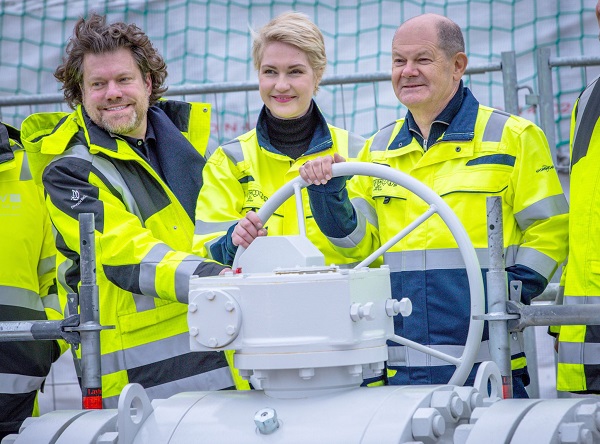By Christopher Hirsch, dpa I Saturday, January 14, 2023
MECKLENBURG – Germany’s second liquefied natural gas (LNG) terminal in Lubmin in the north-eastern German state of Mecklenburg-Vorpommern was opened on Saturday in the presence of Chancellor Olaf Scholz.
“We are pleased that today we are taking another step towards energy security in Germany,” said Mecklenburg-Vorpommern’s state premier Manuela Schwesig. The state’s environment minister, Till Backhaus, had previously handed over the operating licence to Ingo Wagner, managing director of operator Deutsche Regas.
Afterwards, Scholz visited the floating terminal. After Wilhelmshaven in Lower Saxony, where a terminal was officially opened in December, Lubmin on the Baltic coast is the second German location where a LNG terminal has started operations.
Gas has already been injected into the grid since the beginning of the week as part of a test operation.
The Lubmin site forms a key part of Germany’s strategy to turn away from Russian fossil fuels to other sources of energy. Since the outbreak of war in Ukraine, Russia has stopped delivering gas via undersea pipeline to Germany.
Germany is rapidly building up its gas import infrastructure. Within months, the two terminals now in operation were planned, approved and built.
Another terminal in Brunsbüttel on the North Sea coast is due to start up shortly.
LNG is delivered by ship from several regions of the world, converted back into gas and fed into the gas grid. In addition to increased purchases of pipeline gas from Norway, for example, LNG is intended to replace missing Russian supplies.
The floating terminals already deployed or planned have a feed-in capacity of around 5 billion cubic meters of natural gas per year, depending on local conditions.
By comparison, nearly 60 billion cubic meters came through now-defunct Russia-to-Germany Nord Stream 1 pipeline in 2021.
Germany aims to cover about one-third of its current gas demand via the floating LNG terminals in the winter of 2023-24.
While there were warnings of a gas shortage this winter, this scenario currently seems unlikely. Most recently, gas storage facilities in Germany were still more than 90% full after private households and industry reduced their consumption.
According to the operator, the Lubmin terminal is the only completely privately financed terminal in Germany to date. The company Deutsche Regas put the costs at €100 million ($108 million).
Robert Habeck, the minister for economic affairs and climate protection, had also planned to be in attendance at Lubmin on Saturday but fell ill.
